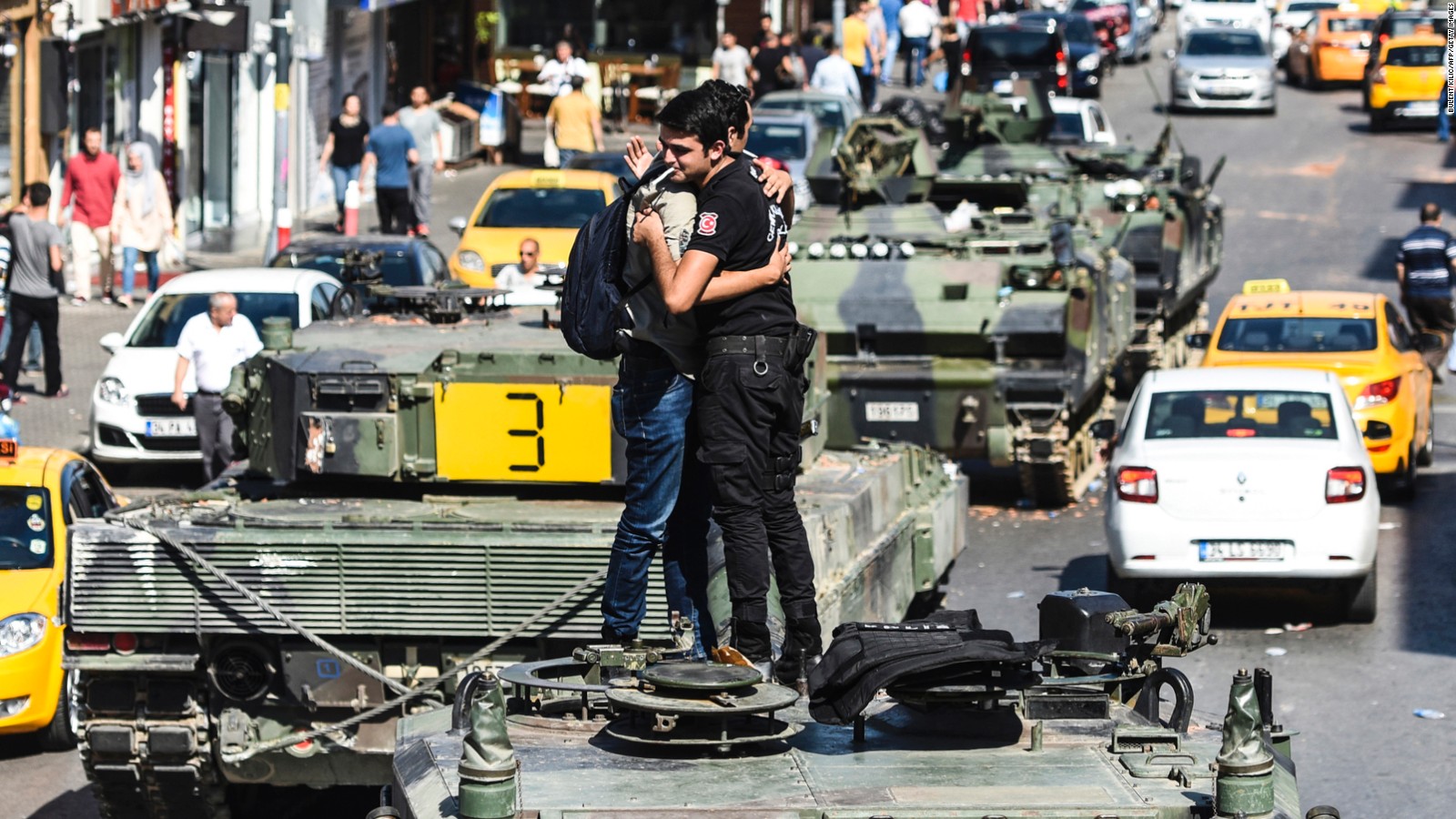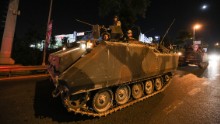A violent, chaotic night in Turkey ended with at least 161 people dead,
but the government said Saturday it remains firmly in control following a
coup attempt by some members of the military.

Meanwhile,
Turkish military authorities have closed the airspace around Turkey's
Incirlik air base -- the site Turkey allows the United States to use for
operations related to its air campaign against ISIS in Syria and Iraq
-- a U.S. defense official told CNN on Saturday.
This
has led to a halt in U.S. airstrike missions against ISIS from that
location, the official said on condition of anonymity. Turkish officials
told the United States that the airspace has been closed until they can
make sure all elements of the Turkish air force are in the hands of
pro-government forces after Friday's coup attempt, the U.S. official
said.
There
was one exception: A small number of U.S. planes that already were on
missions before the airspace closed have been allowed to return and land
at Incirlik, the official said, adding that there is no clear
understanding about how long the airspace closure will last.
Earlier,
the U.S. consulate in Adana reported that power to the base had been
cut and local authorities were preventing movement onto and off the
site. The consulate warned U.S. citizens to avoid the area.
The
base is home to the Turkish Air Force and the U.S. Air Force's 39th Air
Base Wing, which includes about 1,500 American personnel, according to
the base's website.
Uprising 'under control'
The
latest developments came just hours after Prime Minister Binali
Yildirim said the situation in Turkey was under control, with all
military commanders back to work.
"Our
nation in this incident has shown a great resilience," Yildirim said.
"Those who have done this uprising should understand this reality that
no one can play games with the stability of this country and the love of
freedom and democracy."
Chaos
broke out Friday night when military tanks rolled onto the streets of
Ankara and Istanbul and soldiers blocked the famous Bosphorus Bridge.
Blasts rang out, leaving stunned residents wondering what was going on.
Turkey's attempted coup: By the numbers
• At least 161 people killed
• 2,839 military officers were detained
• At least 1,140 people wounded
• 1 airfield still under military faction's control
• At least 200 soldiers turned themselves in to police in Ankara
• 11 years: Erdogan's reign as Prime Minister
• 2014: Year that Erdogan ran for President -- and won
• 2,839 military officers were detained
• At least 1,140 people wounded
• 1 airfield still under military faction's control
• At least 200 soldiers turned themselves in to police in Ankara
• 11 years: Erdogan's reign as Prime Minister
• 2014: Year that Erdogan ran for President -- and won
The
Turkish military claim of a takeover was read by an anchor on state
broadcaster TRT. She said the military imposed martial law.
The
military said it seized control of the country to maintain democratic
order, adding that the "political administration that has lost all
legitimacy has been forced to withdraw."
The
attempted coup appeared to lose momentum after a defiant President
Recep Tayyip Erdogan returned from a vacation at the seaside resort of
Marmaris and declared his government was in control. But by the time he
reemerged after hours of silence, dozens of people had died in the
violence.
Of the 161 deaths, most
were police officers killed in a gunfire exchange with a helicopter near
the Parliament complex in Ankara, Turkey's NTV reported. It said the
building was damaged.
An additional 1,140 people were wounded, said Yildirim.
A
total of 2,839 military officers were detained, a source in the
President's office said. And the Ankara chief public prosecutor's office
took nearly 200 top Turkish court officials into custody, Anatolian
News Agency reported Saturday.
The
officials include 140 members of the Supreme Court and 48 members of the
Council of State, one of Turkey's three high courts.
8 seek asylum in Greece
A
Turkish helicopter carrying eight men landed in Greece Saturday and the
men aboard requested political asylum, Greek government spokeswoman
Olga Gerovasili said.
In response
to this news, Turkish Foreign Minister Mevlut Cavusoglu tweeted that
Turkey has "requested the immediate surrender of eight heinous soldiers
who escaped to Greece with a helicopter."
Greece
is considering the asylum request, and the helicopter -- which landed
at an airport in Alexandroupoli, near the Turkish border -- will be
returned to Turkish authorities, Gerovasili said. The helicopter landed
after issuing a distress signal regarding a mechanical failure,
Gerovasili said.
How the night's violence unfolded
Witness
Katherine Cohen, an American who's staying in an Istanbul hotel, said
she heard a loud explosion at sunrise, and gunfire and jets all through
the night.
For much of the night,
fighter jets flew low over Istanbul while armored vehicles streamed
across a main bridge in the city. Gunshots rang out on Bosphorus Bridge,
sending pro-government protesters to the ground.
In Ankara, gunfire rang overnight as jets circled above.
"When I stuck my head out, I could see helicopters shooting," said Diego Cupolo, a photojournalist in Ankara.
He said he could see tracer rounds zip through the air.
Bombs
were thrown at the Parliament building in Ankara. A helicopter the
government says was stolen by coup plotters was shot down by an F-16.
Erdogan emerges
As the morning wore on, crowds emptied out of Istanbul's Taksim Square, where many gathered the night before.
In Istanbul, a defiant Erdogan addressed crowds, telling them that the coup had been quashed.
"The
government is in control," he told supporters as they chanted his name.
"Fifty percent of the people elected the President and that President
is on duty."
He said those involved will be dealt with.
"So
far as we believe, so far as we're alive, we'll be prepared to die in
the cause to tackle these people ... we're not going to compromise."
The surrender
Shortly after dawn, video footage showed
soldiers surrendering en masse. At least 200 soldiers turned themselves
in to police in Ankara, Turkish state media reported.
They
walked away from tanks and abandoned their posts on the Bosphorus
Bridge, which connects the European and Asian sides of Istanbul.
Turkish Airlines resumed flights out of Istanbul Ataturk airport, which had earlier been overrun by protesters.

Erdogan called the attempted coup "treason" and took to task the forces he apparently suspects of masterminding it.
"Now
I'm addressing those in Pennsylvania," he said, in an apparent
reference to Fethullah Gulen, a cleric and former ally who lives in
exile in Pennsylvania.
"The
betrayal you have shown to this nation and to this community, that's
enough. If you have the courage, come back to your country. If you can.
You will not have the means to turn this country into a mess from where
you are."
In a statement, Gulen denied any connection to the coup attempt and said he condemned it.
Assessing the damage
Tens of thousands of protesters took to the street after Erdogan's call to confront the military was broadcast on television.
Many
waved Turkish flags and chanted their support for the President. Some
climbed on tanks and blocked the path of military vehicles with their
cars. But some soldiers got hugs from apparent supporters.
Ömer Çelik, Turkey's EU negotiator, tweeted images that he said showed some of the damage at the Turkish Parliament:
"Our
country has been subjected to treacherous enemy attack, which displays
betrayal to the nation, their uniforms and morals. The necessary
response has been shown to the enemy and it is still being shown," he
said.
Erdogan's rise to power
Erdogan was elected Prime Minister in
2003. Under his rule, Turkey became a powerhouse in the Middle East. His
reign came to an end in 2014, and his own party's rules prevented him
from seeking a fourth term.
He ran
for President -- and won. Before this, the President of Turkey was a
largely ceremonial role, but Erdogan tried to change that by altering
the constitution to give him more power.
Under
Erdogan, who is extremely conservative, religion had started to play a
more important role in Turkey, which is a largely secular country. He
was active in Islamist circles in the 1970s and 1980s.
How did Turkey get here?
Friday's coup attempt is the latest worrying example of deteriorating stability in a country that a few years ago was being promoted to the wider Muslim world as a model of democratic governance and economic prosperity.
Some 14 years after the Erdogan's political party swept to power in elections, Turkey once again teeters on the brink.
Today,
the Turkish government is simultaneously battling two deadly terrorist
organizations -- ISIS and the separatist Kurdistan Workers Party (PKK).
Society
is widely polarized between people who love or loathe Erdogan. Security
services routinely use force to crush attempts at public protests
against the government. Human rights groups constantly criticize the
government for the arrest of critical journalists.
The violence has also taken its toll on the tourism industry and the value of the country's currency.












































No comments:
Post a Comment